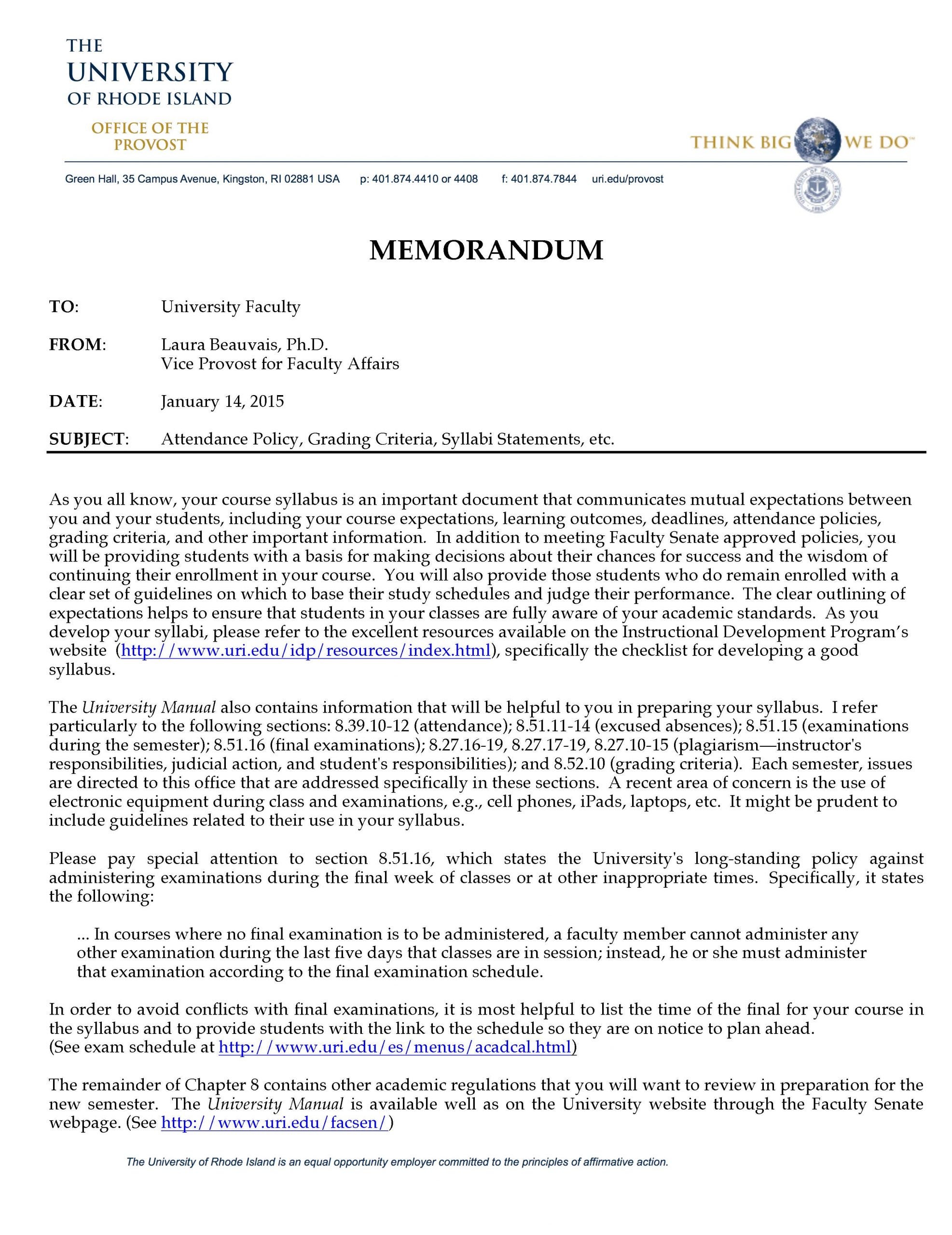MEMORANDUM
TO: University Faculty
FROM: Laura Beauvais, Ph.D., Vice Provost for Faculty Affairs
DATE: January 14, 2015
SUBJECT: Attendance Policy, Grading Criteria, Syllabi Statements, etc.
As you all know, your course syllabus is an important document that communicates mutual expectations between you and your students, including your course expectations, learning outcomes, deadlines, attendance policies, grading criteria, and other important information. In addition to meeting Faculty Senate approved policies, you will be providing students with a basis for making decisions about their chances for success and the wisdom of continuing their enrollment in your course. You will also provide those students who do remain enrolled with a clear set of guidelines on which to base their study schedules and judge their performance. The clear outlining of expectations helps to ensure that students in your classes are fully aware of your academic standards. As you develop your syllabi, please refer to the excellent resources available on the Instructional Development Program’s website, specifically the checklist for developing a good syllabus.
The University Manual also contains information that will be helpful to you in preparing your syllabus. I refer particularly to the following sections: 8.39.10-12 (attendance); 8.51.11-14 (excused absences); 8.51.15 (examinations during the semester); 8.51.16 (final examinations);8.27.16-19, 8.27.17-19, 8.27.10-15 (plagiarism—instructor’s responsibilities, judicial action, and student’s responsibilities);and 8.52.10 (grading criteria). Each semester, issues are directed to this office that are addressed specifically in these sections. A recent area of concern is the use of electronic equipment during class and examinations, e.g., cell phones, iPads, laptops, etc. It might be prudent to include guidelines related to their use in your syllabus.
Please pay special attention to section 8.51.16, which states the University’s long-standing policy against administering examinations during the final week of classes or at other inappropriate times. Specifically, it states the following:
… In courses where no final examination is to be administered, a faculty member cannot administer any other examination during the last five days that classes are in session; instead, he or she must administer that examination according to the final examination schedule.
In order to avoid conflicts with final examinations, it is most helpful to list the time of the final for your course in the syllabus and to provide students with the link to the schedule so they are on notice to plan ahead.
(See exam schedule at https://web.uri.edu/enrollment/academic-calendars/)
The remainder of Chapter 8 contains other academic regulations that you will want to review in preparation for the new semester. The University Manual is available well as on the University website through the Faculty Senate webpage. (See https://www.uri.edu/facsen/)
With regard to academic honesty, understanding the culture of source management and attribution in academe is a process of learning and relearning, with increasing complexity over time. Our goal is to better distinguish between intentional plagiarism or cheating, and making mistakes. URI’s Student Handbook, in particular Section 1.4, provides guidelines concerning academic honesty in this regard. Additional assistance is available at the Writing Center and the Academic Enhancement Center. It may be useful to add a statement in your syllabi using the following language:
Students are expected to be honest in all academic work. A student’s name on any written work, quiz or exam shall be regarded as assurance that the work is the result of the student’s own independent thought and study. Work should be stated in the student’s own words, properly attributed to its source. Students have an obligation to know how to quote, paraphrase, summarize, cite and reference the work of others with integrity. The following are examples of academic dishonesty.
• Using material, directly or paraphrasing, from published sources (print or electronic) without appropriate citation
• Claiming disproportionate credit for work not done independently
• Unauthorized possession or access to exams
• Unauthorized communication during exams
• Unauthorized use of another’s work or preparing work for another student
• Taking an exam for another student
• Altering or attempting to alter grades
• The use of notes or electronic devices to gain an unauthorized advantage during exams
• Fabricating or falsifying facts, data or references
• Facilitating or aiding another’s academic dishonesty
• Submitting the same paper for more than one course without prior approval from the instructors.
I urge you to provide students with as much information as possible about test schedules, office hours, availability of special tutorial sessions, and expectations on individual assignments. Providing such information can help avoid misunderstanding, frustration—on both sides—and foster a better acceptance of responsibility by our students. In addition, it is most helpful if you make students aware of special services. Two important ones are the Office of Disability Services and the Academic Enhancement Center. For the first, a helpful statement could be as follows:
Any student with a documented disability is welcome to contact me as early in the semester as possible so that we may arrange reasonable accommodations. As part of this process, please be in touch with Disability Services for Students Office at 330 Memorial Union, 401-874-2098 (https://www.uri.edu/disability/dss/) or 239 Shepard Building, Feinstein ProvidenceCampus, 401-277-5221.
For the second, students should be encouraged to take advantage of the opportunity to enrich their learning as follows:
This is a challenging course. Success requires that you keep pace with the work, understand course concepts, and study effectively. The Academic Enhancement Center (https://www.uri.edu/aec/) is a great place to do this. At the AEC you can work alone or in groups, and tutors and professional learning specialists are available to help you to learn, manage your time and work, and study well. On the Kingston campus, it’s open Monday through Thursday from 10 a.m. to 9 p.m. and Fridays until 1 p.m. All services are free (the coffee is free as well!), and no appointment is needed. You can call for complete information at 874-2367, or just stop by the center on the fourth floor of Roosevelt Hall. In Providence, the Academic Skills Center (ASC) is at 239 Shepard Building, (401)277-5221. Hours are posted each semester at https://www.uri.edu/prov/studentresources/help/academicskills.html. Inaddition,theSaturdaySkillsforSuccessprogramoffers workshopsandtutoringfrom10am-1pmduringfallandspring semesters.

